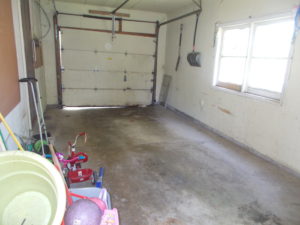We don’t have emergency funds like it is generally advised.
We know how much how regular expenses cost every month. After paying off our credit card debts, tuition, and car loans, our monthly expense is about $1,340. That includes electric, water, gas, cellphone, cable, internet, donation, allowance, and groceries. The mortgage is not included in that budget. We live on one income and use the other income to pay our mortgage and finance our businesses. We meet our needs and live below our means. By recording how much is spent every month, we come to know how much we spend in each category and how to budget for it.
Beside the $1,340 spent very month (mortgage not included), there are some irregular expenses that we consider and budget for, since we don’t have emergency funds. We listed all these irregular expenses on our budget spreadsheet including birthday gift, Christmas gift, home maintenance, kids’ school expenses, car repair and insurance, and medical expenses. We estimated our total annual irregular expenses to be about $4,000 which is $333 a month. Therefore, every month, we put $350 in our saving account for these expenses. Every month, my husband and I go through our budget and decide what expense that should be paid for, from our saving account and move that amount to our checking account in addition to what our regular monthly budget is. Before we paid off our credit cards debts, car, and tuition loans, our expenses were not controlled. Once we paid off these debts, we know that our needs don’t cost us a lot. Saving for those expenses that occur few times a year take away some worries. Two years ago, we needed to replace our car’s tires. It cost us $500 and we were able to afford that without raking a credit card debt. That gave me the idea to list all these rare expenses, categorize them and budget for them so that they are not surprises. For, an unexpected cost saved for is no longer an emergency. Sometimes we can have expenses that would cost more than what we have in our saving. Then we just continue to save until we have enough to afford the expense. However, if the expense is necessary and requires an immediate attention, we have a back plan like reduce what we pay toward the mortgage to afford the expense. As I have mentioned in one of my blog, we live on one income and use the other to pay the mortgage. For instance, we budget $1,000 for home maintenance a year(irregular expense).
Over the winter, our garage door cable broke and the whole garage door should be replaced we were told by the professional.
The cost would be about $1,100. We don’t have that amount saved and it is not urgent. We usually have our car in the garage.
Now we leave it outside in the drive away until the garage door is fixed.
By June we have enough in the saving to replace the garage and intend to do it before the end of fall.
Early this spring the kids broke a window and that should be replaced as well. We taped it at the moment and expect to save enough to replace the whole widow and its frame. The house needed some work when we purchased it and as something breaks down, we just replace it with a quality product we are comfortable with. The window frame is rotted a little and instead of replacing the glass, we will profit and replace the frame as well. In fact it is two windows together. We will replace both. Two years ago, a company came to give us a free estimate to replace all our windows but the one in the living room. They estimate it would cost us a little over $10,000 to install insulated windows and save on gas. After doing some research, I told my husband that I don’t think the saving on gas would be enough to justify the cost of the window. By the time we break even which would be after 25 years, it would be the time to replace them again. Therefore, we told the company we are not doing it.
We thrive to pay off our mortgage debt as the living expense without debts when it comes to our basic need is quiet low. Our monthly expenses can be reduced even further, as it includes some indulgence as cable. Periodically, we analyze our budget and compare it to our actual expenses that we record every month, and make adjustments like increasing or reducing the budget or find ways to reduce cost. If our home maintenance costs more than $1,000 a year over few years, we will increase that budget. But in the meantime we are not tackling any renovation project unless something need to be addressed. It is important to have a budget and know where your hard earned money goes. And if you cannot have at least 6 months of living expenses saved for emergency as recommended by financial advisors, it is less stressful if you budget and save regularly for these expenses that incur once or few times a year. It pays as well to stock up in food a little by little when something we consume is on sale. It might be hard to have 6 months of grocery cost saved in an emergency account, but when you stock up on food during sales, it is easy overtime to stock up on 6 months’ worth of food. You don’t need a big food pantry to do that. You just need to make best use of all the closets and kitchen cabinets available to store your staple. In our house, I decluttered the basement, and downsized to free closets and cabinets space.
I have a small pantry but I stock up on some staple for a year and some for 6 months or less. We purchased three chest freezers over the years and stock up on vegetables in summer when they are on sale to use until the following summer.
https://ninasoap.com/personal-finances/build-your-food-supply-on-budget/
Food, water, basic clothing, and shelter are our main basic needs. If at least 6 months’ worth of food is in stock, in case of hardship, the amount needed to cover rent/mortgage and utilities is far less than if there is no food at home and grocery cost has to be taken into consideration as well.


